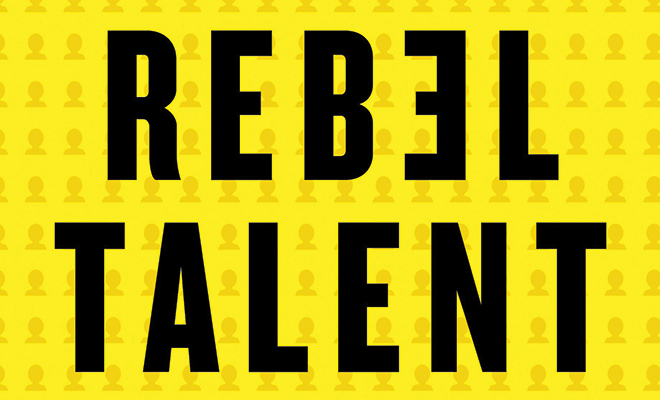
Rebel Talent by Francesca Gino and Gigged by Sarah Kessler
Your latest hire came highly recommended. Her former employer spoke favorably about her but there was something unsaid that you picked up on, and it’s nagging you. She’s very competent; and yet, she’s also pretty far outside the box. Read Rebel Talent by Francesca Gino and you’ll wish you had more employees like her.
Your business undoubtedly runs on rules: when to be at work, how to claim territory, when to meet, when to leave. That’s how a business runs, except when it doesn’t. Sometimes, rules need to be stretched, bent and broken. In her career as a researcher, Francesca Gino studies things like that, how employees react to rules, and how corporations thrive or fail. As it turns out, those are all strongly linked and what Gino calls “rebel talent” may be a powerful game-changer.
Being a rebel talent doesn’t mean “becoming an outcast;” it’s more of a nonconformity thing. It’s being confident and mature enough to understand which rules are immovable and how to break the ones that aren’t. Rebel talent is knowing then how to harness the power that comes when behaving “in ways that are unconventional or unexpected.”
Gino describes five core elements of rebel talent. Novelty is the embrace of new, the celebration of differences and ritual, and the ability to see when change is “clearly in our best interest.”
Curiosity makes toddlers ask “why?” It’s also where innovation comes from and new ideas are launched. Perspective is the ability to turn personal experience into real-time relevance. Diversity is knowing that differences aren’t divisive but are enhancements offering “a competitive advantage.” Authenticism is staying engaged, living honest, embracing your imperfections and doing what you do best.
In addition to its informative value, Rebel Talent is a blast to read. Gino doesn’t take a cause-and-effect tactic. Readers don’t even get instruction here; instead, you’ll read anecdote after example of small businesses and national corporations that turned around, grew or reinvigorated after doing things in ways that counteracted conventional wisdom. Gino advocates allowing workers more autonomy and listening to what they have to say about their workplace, and she shows how not doing so can hurt both entity and employee. Plenty of research backs up what Gino says, and humor keeps you engaged. Reading this book is like thinking outside several boxes simultaneously. Rebel Talent is fun, and it comes highly recommended.
Gigged: The End of the Job and The Future of Work by Sarah Kessler
Your allowance was never enough, as a kid. Sure, it bought you what you needed but what you wanted, well, you had to figure that out yourself. A dime here, a dollar there, and you made it work. As you’ll see in Gigged, some things never change.
In 2011, when she was a reporter for a tech blog, Sarah Kessler became aware of a new start-up that used non-traditional workers in non-traditional ways. It was called Uber, and its business concept seemed unusual; having grown up in rural Wisconsin, Kessler had no frame of reference, and she paid it little heed. Eventually, she began to see that Uber’s model was being used for a lot of start-ups and could, potentially, benefit a lot of people. Was this gig economy really the way of the future?
It had been around a while; in the early 1970s, Kelly Girls were available for temp work; becoming a Kelly Girl was advertised as a way to pay for life’s extras. But research showed then, as it does now, that temp working and gig economy jobs are taken more as a way to make ends meet. Intrigued, Kessler began following a few people who paid the bills with a string of non-traditional jobs they took for a variety of reasons, such as the young and tech-savvy (or learning). Their backgrounds varied, as did their races; they fit in with the average gig worker, the numbers of which “grew 47-fold between 2012 and 2015.”
While gig-working paid the bills for Kessler’s subjects, she learned that it was not all good. Yes, there was “independence, flexibility, and freedom” but at what price? For workers, it offered often-low pay, few-to-no benefits and no safety net. For employers, it saved money, but the hassles were daunting and “churn” could churn one’s stomach.
Is this the future? In Gigged, Kessler offers tantalizing clues and more than one caveat. For anyone who’s stuffed envelopes for pennies or wondered if there’s real cash to be made gigging, this book sets it straight. Kessler’s subjects made money but it was hard, hard work and none of them are still gig-economy workers. For business owners, it’s more complicated. Kessler outlines laws and rules that make your head spin. Further legislation is coming; we haven’t heard the final word on this subject. Change occurs frequently. In the meantime, Gigged is interesting, informative and timely; until the dust has settled, that’ll have to be enough. ■







